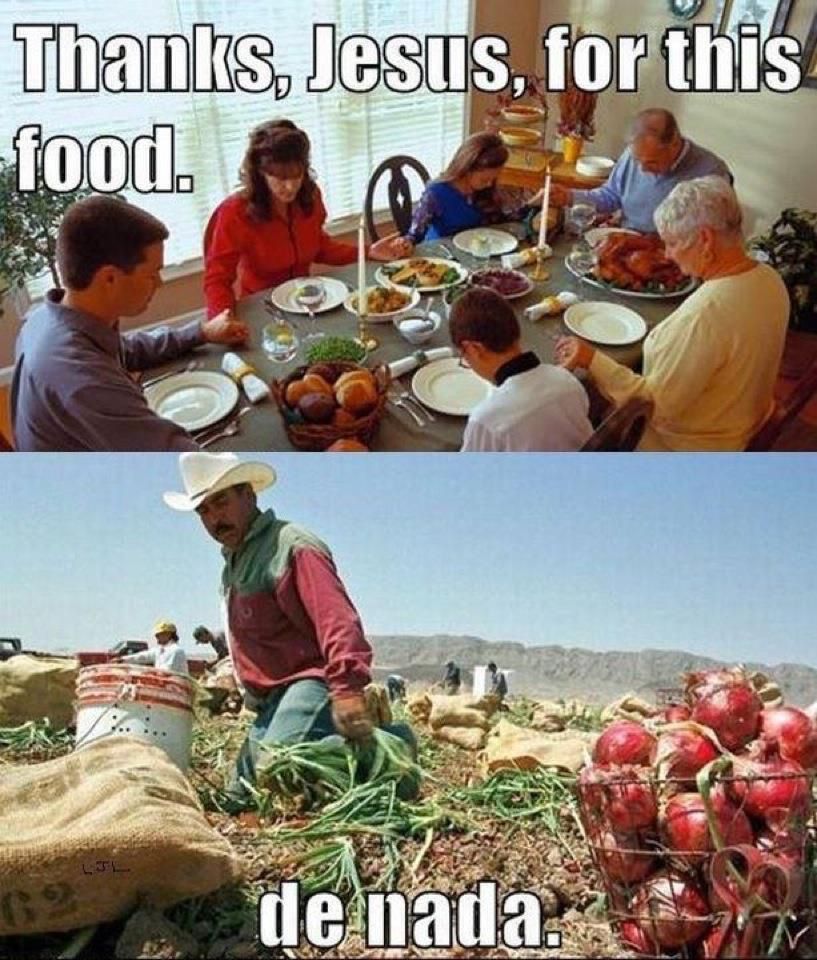1/50

cwebbonline.com
Where are the red Make America Great Again hats out in the fields? You know, the same people who swore immigrants were “taking their jobs.”
Keep snatching hard-working folks who are just trying to support their families and don’t be shocked when this becomes the new norm.
2/50

oeishik.bsky.social
We're literally watching our prosperity rotting in the fields. Thanks to Donald's bigotry & disruption.
youtu.be/XT0wpT_62OM
3/50

cwebbonline.com
You nailed it.
4/50

ernest33141.bsky.social
Totally TOP
5/50

otrodia.bsky.social
6/50

wombatbitme.bsky.social
I think I’ve run out of words for maga idiocy
7/50

blabalino.com
Put the Florida National Guard to work rounding up MAGA unemployed to work the fields. Must be more interesting then cleaning up and laying mulch.
8/50

skowalchuk.bsky.social
Great idea!
9/50

hooroousa.bsky.social
You can't believe that the maggots would WORK.
10/50

stevegangi.bsky.social
Bad accent from old war movie... "Ve haff vays to make you verk"
11/50

robertcpadilla.bsky.social
This economy is fundamentally reliant on immigrant workers.
That is why it's important not to deport them but to help them get documented.
It actually makes economic sense.
12/50

tedium24x7.bsky.social
Unfortunately, bigots who don't know how anything works have been put in charge of the country.
13/50

freetahfox.bsky.social
This was all planned. Those bigots were very carefully cultivated by soulless men with very deep pockets and in the overall picture they had no more choice than a cog in a huge machine over which way it turns.
14/50

pasandy.bsky.social
These farmers now want the government (us) to pay the losses these policies cost them.
15/50

cwebbonline.com
Trump doesn’t care about those farmers. Even though most of them voted for him.
16/50

ra59050.bsky.social
He will reimburse them & they keep voting for him.
17/50

eheart.bsky.social
They know that. That’s one reason they keeping voting for Republicans. It’s shameful, but they have no shame or morals.
18/50

bluedoggy.bsky.social
It is about the racism, the cruelty. None of this makes farm sense, or any type of business sense.
19/50

sandyinthepacnw.bsky.social
None of it makes sense because it’s not supposed to. Cruelty is the design. The Mad King hoards wealth and power while everyone else is left to rot. That’s the point.
20/50

waffa.bsky.social
Meanwhile, many are starving in Gaza as our food rots in the fields...
21/50

sommaf.bsky.social
It's so awful.
22/50

call634-5789.bsky.social
23/50

scooter1981.bsky.social
But I do own 47 guns…
24/50

angrylibra.bsky.social
Where are all the racist whites that wanted to get rid of all the brown people because they were scared of them stealing their jobs????
25/50

natureskid.bsky.social
As a Libra myself, I agree…!
26/50

jaimec66.bsky.social
27/50

greglwhite.bsky.social
President George Bush Jr. could join Mensa compared to this guy. I don't want a President "like me", I want one a whole lot smarter than most people, and hires smart.people to help with the stuff they don't know.
28/50

battleax-70.bsky.social
Christopher, I was born & raised in CA & know who walks the rows.
I supported the Grape Boycott & fight for the UFW.
I know who works the feedlots, harvests the apples, works the rich Earth. Who breaks their backs under that blazing Sun.
Not Anglos for sure, get food from field to plate.
29/50

upine.bsky.social
They DK this is happening bc most media are Right Wing & don't cover such things. They only cover pretty lies about T/GOP & ugly lies about Dems.
And that's why they voted GOP to begin with too.
upine.medium.com/the-vast-rea...
30/50

djmabeizy.bsky.social
You are spot on Julie
31/50

himself132.bsky.social
There was a similar problem after Brexit.
32/50

noelkeith.bsky.social
This is part of why I say that Trump slumps a drools a bit as he rides Famine;
Hegseth looks queasy as he pulls up on War;
RFK, jr sits astride Pestilence with what’s destined to be the biggest body count by far;
Of course Putin is shirtless as he gallops around on Death.
33/50

imzadi4410.bsky.social
The Four Horsemen of the Modern Apocalypse. #StopICE
Bluesky
34/50

natureskid.bsky.social
OH MY HOLINESS, BIBLICAL AWAKENING TO END OF DAYS……!
35/50

mrayburn8743.bsky.social
I bet the owner of this patch voted for Trump.
36/50

mickey23.bsky.social
Also farmer in Fl lost his whole tomatoes crop, this is happening folks, the price of fresh fruits, vegetables skyrocketing, expect shortages, this is what U voted for Maga, and it's gonna get worse. Voting has consequences.
37/50

flathdlake.bsky.social
As does not bothering to vote.
38/50

americaisdoomed.bsky.social
all the tough jobs are done by immigrants because “real americans” are too weak and lazy to do these jobs. america is weak. Not even a first world country anymore. A failed nation.
39/50

pastajoe.bsky.social
40/50

robertschlesinger.bsky.social
Econometric models forecast that Trump & Commerce Secretary Howard Lutnick have so damaged the U.S. economy with impulsive tariffs & ICE raids that a socio-economic collapse is soon possible in the U.S.
Amazing how fast Trump & Lutnick destroyed a once great superpower, while personally profiting.
41/50

tenderheartstrong.bsky.social
Looks just fukking like him
42/50

cykoore.bsky.social
The Year Without a Harvest
bsky.app/profile/cyko...
43/50

sandyinthepacnw.bsky.social
Next up: children in berry fields and folks on antidepressants harvesting lettuce. RFK Jr. floated that idea with a straight face.
44/50

jerrettsnyder.bsky.social
A straight face and a voice of a 10 pack a day smoker, or maybe it's his brainworm that makes his voice sound like he drinks gasoline and bleach all day.
45/50

jc-82.bsky.social
They want to buy up farmland. JD V has financial ties to AcreTrader. Buying up distressed farms and selling to foreign investors. What will it take for these guys to wake up and figure out the intent was always to screw them out of their farms so JD can turn a profit off their misfortune.
46/50

wonderful1.bsky.social
What a pity.
Remove DeSatan and De Felon
47/50

deborahk777.bsky.social

48/50

sailingsteve.bsky.social
And the farmer/owner voted for whom???
49/50

grantmountieofanna.bsky.social
What a horrible waste. All for the rapist Trump regime.
50/50

pissedashell.bsky.social
It was already well-known that the majority of white Americans were NEVER going to take the manual labor jobs left vacant by hard-working immigrants! This Country's idiotic racism will be key in our undoing!!
To post tweets in this format, more info here: https://www.thecoli.com/threads/tips-and-tricks-for-posting-the-coli-megathread.984734/post-52211196
 "
"













